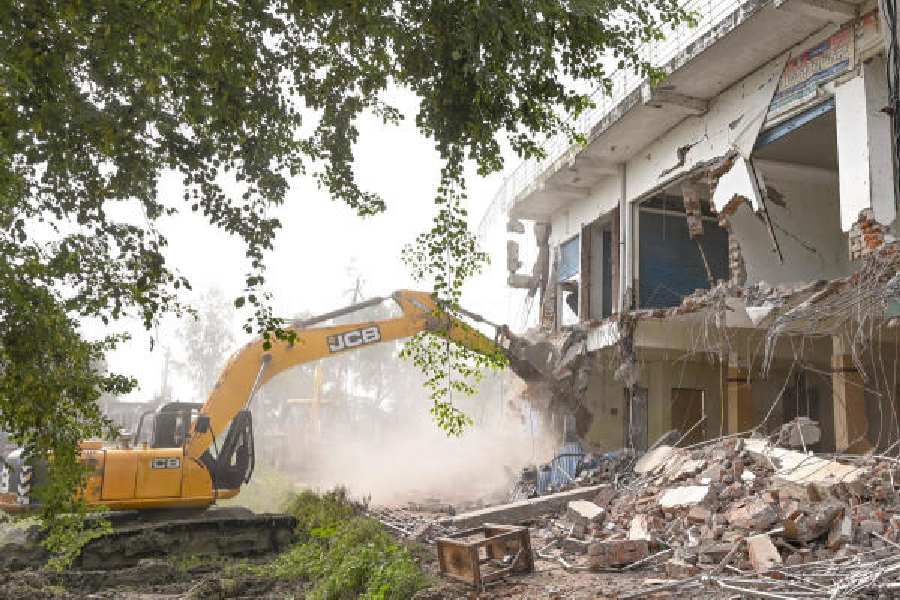The Supreme Court on Wednesday severely criticised the Uttar Pradesh government’s use of bulldozers to demolish alleged illegal encroachments on government land, calling the practice an example of “lawlessness” and “high-handedness”.
The court directed the state to pay ₹25 lakh in compensation to an individual whose property was demolished without proper legal procedures. The court also came up with guidelines requiring authorities to issue prior notices to individuals before initiating such demolitions.
The sharp rebuke follows earlier criticism by another bench of Justice B.R. Gavai and Justice K.V. Viswanathan, which had reprimanded the Yogi Adityanath government for its frequent use of bulldozers to clear properties linked to alleged criminals. The Adityanath government has been accused of demolishing the properties of critics and members of the minority community.
The bench headed by Justice Gavai had passed two orders on September 17 and October 1 restraining authorities across the country from demolishing alleged illegal properties with bulldozers.
However, even as the Justice Gavai bench is seized of the matter and had intended to lay down general guidelines on demolitions of illegal properties, the bench helmed by Chief Justice of India D.Y. Chandrachud on Wednesday passed the order relating to a 2020 suo motu case initiated by another bench headed by Justice Ashok Bhushan (since retired). The petitioner before Justice Bhushan was Manoj Tibrewal Akash, who had challenged the demolition of his property in Maharajganj allegedly without allowing him to defend his case.
“You just can’t come with a bulldozer and demolish houses overnight. You don’t give families time to vacate? What about household articles? There has to be due process of law that has to be followed,” said Justice J.B. Pardiwala, the other judge on Wednesday’s bench which also included Justice Manoj Misra.
The Uttar Pradesh government’s standing counsel argued that not just Akash’s house, but nearly 123 other “illegal encroachments” had been demolished to lay roads. The bench, however, was not convinced.
“You say that he was an encroacher of 3.7sqm, we take it, we are not giving him a certificate for it, but how can you start demolishing people’s houses like that? This is lawlessness, walking into somebody’s house and then demolishing the properties without the authority of law,” Justice Chandrachud observed.
He added: “This is completely high-handed. Where is the due process followed? We have an affidavit (by the petitioner) that says no notice was issued; you only went to the site and informed the people.”
The bench said the state cannot say it had informed people through the beat of drums about the impending demolitions.
It referred to a report submitted by the National Human Rights Commission (NHRC) which had recorded a finding that the house was demolished without proper notice or adequate time for the victim to respond. The action of the Uttar Pradesh government was in excess of the alleged crime of encroachment, the NHRC had stated.
When the state government’s counsel persisted with the argument that the encroachments were illegal, Justice Pardiwala asked: “What is the basis for you to say it was unauthorised? What have you done since 1960? What have you been doing for the past 50 years? Very high-handed. The state has to show some respect for NHRC orders. Instead, you sit tight and are protecting the actions of an officer.”
In this case, the apex court had issued a notice to the UP government on December 7, 2020. The matter was listed last on January 4, 2021. Thereafter it was listed only on Wednesday before a bench headed by the CJI.
Justice Chandrachud dictated an order in the court directing the UP government to pay “within one month” a compensation of ₹25 lakh and also take disciplinary action against the officials concerned for demolishing the properties. The court said action must also be taken against the contractors.
The bench said that henceforth the authorities must mandatorily give prior notice to alleged illegal encroachers and allow “reasonable time” for them to respond. The directives would apply to the Centre, states and the Union Territories.











